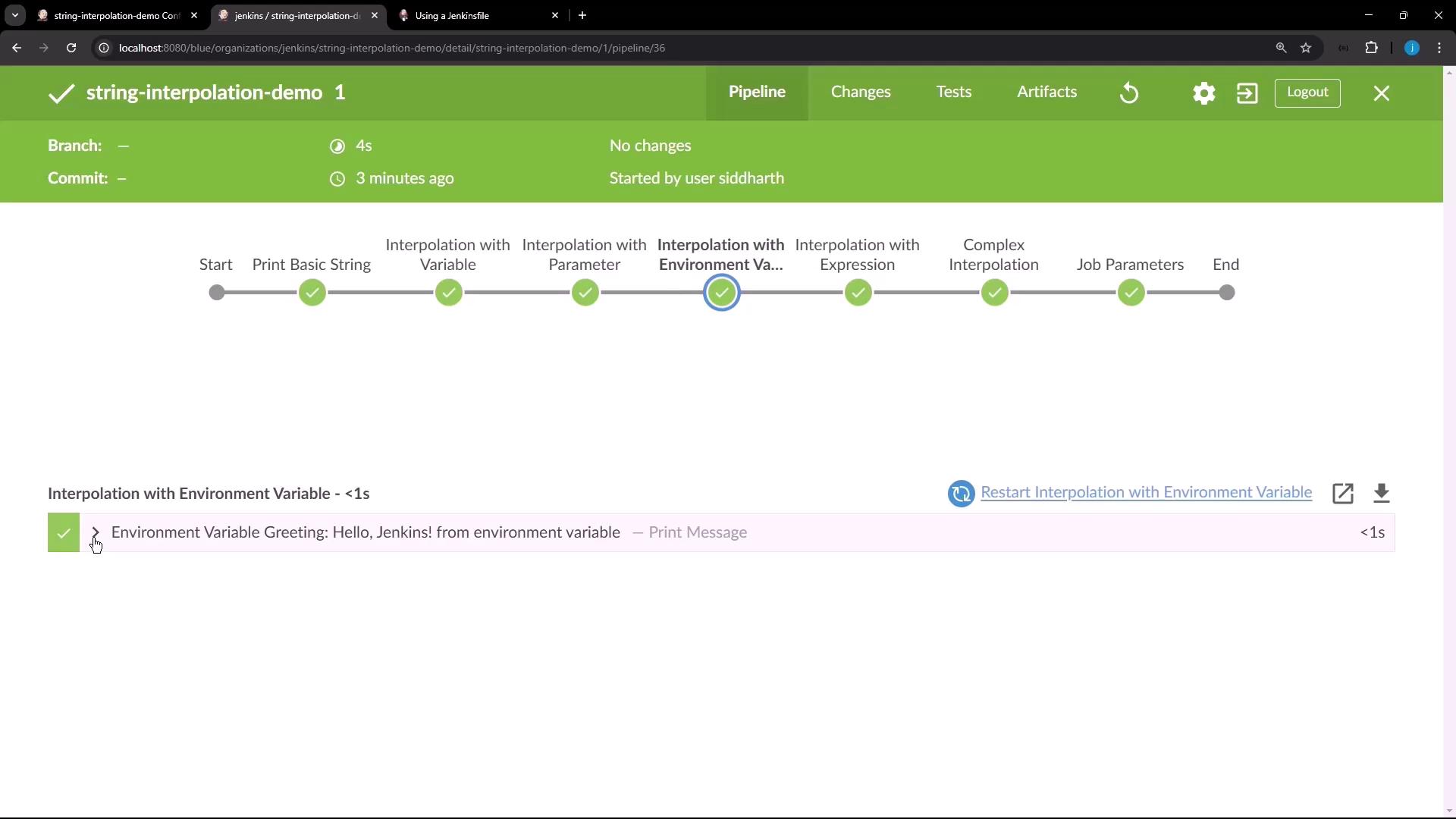Certified Jenkins Engineer
Code Quality and Testing
Demo String Interpolation
Understanding string interpolation in Jenkins pipelines is essential for creating dynamic build messages, parameterized workflows, and environment-aware configurations. This guide demonstrates how Groovy handles single-quoted and double-quoted strings and walks through a Jenkinsfile showcasing various interpolation techniques.
Why String Interpolation Matters
- Simplifies logging and notifications
- Enables dynamic parameter and environment variable usage
- Integrates arithmetic and complex Groovy expressions
Note
In Groovy, single quotes produce literal strings, while double quotes evaluate ${} expressions.
Single vs. Double-Quoted Strings
def singlyQuoted = 'Hello'
def doublyQuoted = "World"
def username = 'Jenkins'
echo 'Hello Mr. ${username}' // Outputs: Hello Mr. ${username}
echo "I said, Hello Mr. ${username}" // Outputs: I said, Hello Mr. Jenkins
| Quote Type | Behavior | Example |
|---|---|---|
| Single Quotes | Literal string; no eval | 'Hello ${username}' |
| Double Quotes | Enables interpolation | "Hello ${username}" |
Complete Jenkinsfile Example
pipeline {
agent any
parameters {
string(
name: 'USER_NAME',
defaultValue: 'Hello, Jenkins from Parameter',
description: 'Name of the user'
)
}
environment {
GREETING = 'Hello, Jenkins! from environment variable'
}
stages {
stage('Print Basic String') {
steps {
echo 'Basic String Interpolation Examples:'
}
}
stage('Interpolation with Variable') {
steps {
script {
def name = 'Jenkins User'
echo 'Hello, ${name}!' // single quotes: no interpolation
echo "Hello, ${name}!" // double quotes: interpolates
}
}
}
stage('Interpolation with Parameter') {
steps {
script {
echo "Hello, ${params.USER_NAME}"
}
}
}
stage('Interpolation with Environment Variable') {
steps {
script {
echo "Environment Variable Greeting: ${env.GREETING}"
}
}
}
stage('Interpolation with Expression') {
steps {
script {
def x = 5
def y = 10
echo "Sum of x and y is: ${x + y}"
}
}
}
stage('Complex Interpolation') {
steps {
script {
def list = [1, 2, 3]
echo "The list has ${list.size()} items: ${list.join(', ')}"
}
}
}
stage('Job Parameters') {
steps {
script {
def buildNumber = currentBuild.number
echo "This is build number ${buildNumber}"
}
}
}
}
}
Stage 1: Print Basic String
A straightforward echo of a static message.
Basic String Interpolation Examples:
Stage 2: Interpolation with Variable
Comparing single vs. double quotes around a Groovy variable.
def name = 'Jenkins User'
echo 'Hello, ${name}!' // single quotes: no interpolation
echo "Hello, ${name}!" // double quotes: interpolates
Hello, ${name}!
Hello, Jenkins User!
Stage 3: Interpolation with Parameter
Displaying a pipeline parameter using params.
echo "Hello, ${params.USER_NAME}"
Hello, Hello, Jenkins from Parameter
Stage 4: Interpolation with Environment Variable
Pulling in an environment variable via env.

echo "Environment Variable Greeting: ${env.GREETING}"
Environment Variable Greeting: Hello, Jenkins! from environment variable
Stage 5: Interpolation with Expression
Executing arithmetic inside the interpolation.
def x = 5
def y = 10
echo "Sum of x and y is: ${x + y}"
Sum of x and y is: 15
Stage 6: Complex Interpolation
Leveraging list methods directly in the string.
def list = [1, 2, 3]
echo "The list has ${list.size()} items: ${list.join(', ')}"
The list has 3 items: 1, 2, 3
Stage 7: Job Parameters
Accessing the current build number for dynamic context.
def buildNumber = currentBuild.number
echo "This is build number ${buildNumber}"
This is build number 1
Additional Resources
Watch Video
Watch video content